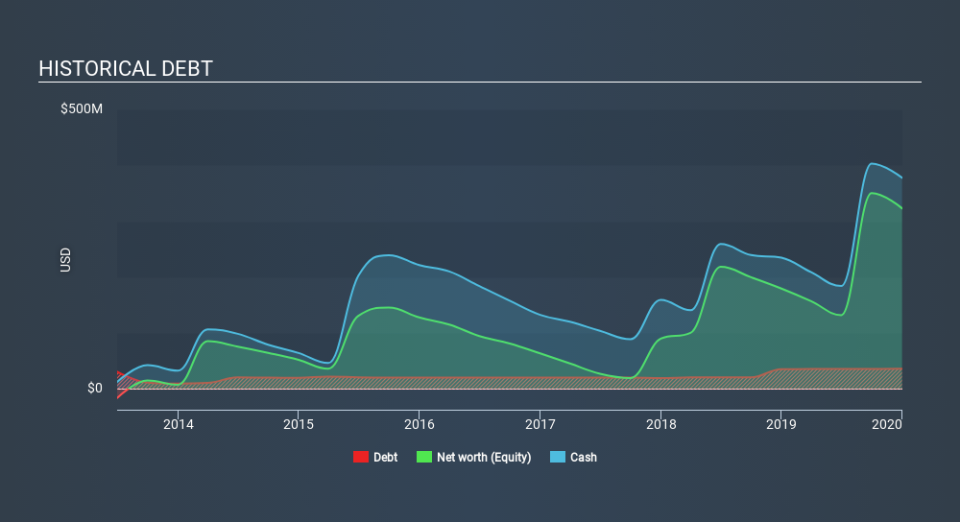Does uniQure (NASDAQ:QURE) Have A Healthy Balance Sheet?

Warren Buffett famously said, 'Volatility is far from synonymous with risk.' So it seems the smart money knows that debt - which is usually involved in bankruptcies - is a very important factor, when you assess how risky a company is. As with many other companies uniQure N.V. (NASDAQ:QURE) makes use of debt. But the real question is whether this debt is making the company risky.
When Is Debt Dangerous?
Generally speaking, debt only becomes a real problem when a company can't easily pay it off, either by raising capital or with its own cash flow. Ultimately, if the company can't fulfill its legal obligations to repay debt, shareholders could walk away with nothing. However, a more frequent (but still costly) occurrence is where a company must issue shares at bargain-basement prices, permanently diluting shareholders, just to shore up its balance sheet. Having said that, the most common situation is where a company manages its debt reasonably well - and to its own advantage. When we examine debt levels, we first consider both cash and debt levels, together.
See our latest analysis for uniQure
What Is uniQure's Debt?
As you can see below, uniQure had US$36.1m of debt, at December 2019, which is about the same as the year before. You can click the chart for greater detail. But on the other hand it also has US$377.8m in cash, leading to a US$341.7m net cash position.
How Healthy Is uniQure's Balance Sheet?
We can see from the most recent balance sheet that uniQure had liabilities of US$31.6m falling due within a year, and liabilities of US$93.9m due beyond that. Offsetting this, it had US$377.8m in cash and US$947.0k in receivables that were due within 12 months. So it actually has US$253.2m more liquid assets than total liabilities.
This surplus suggests that uniQure has a conservative balance sheet, and could probably eliminate its debt without much difficulty. Simply put, the fact that uniQure has more cash than debt is arguably a good indication that it can manage its debt safely. There's no doubt that we learn most about debt from the balance sheet. But ultimately the future profitability of the business will decide if uniQure can strengthen its balance sheet over time. So if you want to see what the professionals think, you might find this free report on analyst profit forecasts to be interesting.
In the last year uniQure had negative earnings before interest and tax, and actually shrunk its revenue by 35%, to US$7.3m. That makes us nervous, to say the least.
So How Risky Is uniQure?
We have no doubt that loss making companies are, in general, riskier than profitable ones. And in the last year uniQure had negative earnings before interest and tax (EBIT), truth be told. Indeed, in that time it burnt through US$105m of cash and made a loss of US$124m. While this does make the company a bit risky, it's important to remember it has net cash of US$341.7m. That kitty means the company can keep spending for growth for at least two years, at current rates. Overall, its balance sheet doesn't seem overly risky, at the moment, but we're always cautious until we see the positive free cash flow. When analysing debt levels, the balance sheet is the obvious place to start. However, not all investment risk resides within the balance sheet - far from it. Be aware that uniQure is showing 3 warning signs in our investment analysis , you should know about...
If, after all that, you're more interested in a fast growing company with a rock-solid balance sheet, then check out our list of net cash growth stocks without delay.
If you spot an error that warrants correction, please contact the editor at editorial-team@simplywallst.com. This article by Simply Wall St is general in nature. It does not constitute a recommendation to buy or sell any stock, and does not take account of your objectives, or your financial situation. Simply Wall St has no position in the stocks mentioned.
We aim to bring you long-term focused research analysis driven by fundamental data. Note that our analysis may not factor in the latest price-sensitive company announcements or qualitative material. Thank you for reading.

 Yahoo Finance
Yahoo Finance 
